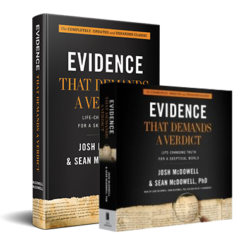
“Have a ready answer for what you believe.”
Contrary to what the world thinks, Jesus did not ask His followers to believe with “blind” faith. Because He didn’t need to. He wasn’t a swindler, a magician, or a con artist. He was God. He spoke the truth, and demonstrated it time and time again.
We know, both from Scripture and the high volume of secular and Christian historical documents uncovered by scholars so far, that Jesus walked this earth, performed amazing miracles, willingly hung on the cross, and talked with hundreds of witnesses after He rose from death.
Historical documentation validates Jesus’ claims of who He says He is. Your faith, then, can be based on the strong foundation of this proof.
Jesus wants us to be active, engaged followers; to believe in Him, but to know why we follow Him. In this year-long blog series, let’s journey through the evidence highlighted in Evidence That Demands a Verdict, the fully revised and expanded apologetics classic by Josh and Sean McDowell. In knowing that our faith should not be blind, but built from historical facts, we gain the power to confidently share the Good News!
Was Jesus an apologist? You bet!
The word “apologetics” does not mean apologizing for your faith. Rather, it refers to your defense of what you know to be true, based on historical fact.
In the Christian arena, then, an apologist is any believer who challenges criticism and distortion of Christianity by supplying evidence of its credibility. We’re talking about a rational defense — not the belligerent, take-no-prisoners response, “God said it, that settles it, you should believe it!” that many Christians default to when challenged by skeptics.
As Douglas Grootuis eloquently puts it: “Contrary to the views of critics, Jesus Christ was a brilliant thinker, who used logical argument to refute His critics and establish the truth of His views.” He adds, “Jesus’ high estimation of rationality and His own application of arguments indicates [sic] that Christianity is not an anti-intellectual faith. Followers of Jesus today, therefore, should emulate His intellectual zeal, using the same kinds of arguments He Himself used.”
Did you catch that last part? Intellectual zeal, people. There’s no blind faith in that.
Apologetics: Cement Your Faith
Okay, so we take it on faith that God, whom we can neither hear nor see, is really with us. Sitting in the dining room chair across from us, perhaps, or in the passenger seat as we bumper it to work during rush hour. But even His presence we don’t take on blind faith.
We believe that God is always with us because in His Word He tells us He is. And we believe what the Bible tells us, because the historical documents from which it was compiled really exist — and have been verified as authentic.
It’s when critics challenge our belief in the Bible, with arguments such as, “No one who knew Jesus personally wrote the Bible,” that we find our faith faltering. But the good news: if we want to know these answers, they are readily available. And after researching them, we’ll be equipped with ready answers the next time we’re asked.
One reason many of us are caving under the pressure of cultural tolerance: we don’t know who God really is, or believe how much He loves us, because we don’t study our Bibles or learn the facts of our faith.
A Christian who doesn’t read his or her Bible — but gladly gobbles up hours of TV — demonstrates how little value he or she places on knowing God better. Because they don’t actively seek to grow their knowledge of their faith, many Christians can’t really say WHY they believe what they believe. Friends, we need a strong foundation of knowing what we know to stand against our postmodern culture’s claims that God is “just a myth” and “truth” is subjective to each person.
Many college freshmen abandon their Christian faith after a professor publicly humiliates them by intellectually beating them up in class. “Prove the claims of Christ!” shouts the professor. Lacking a ready knowledge of facts, the students cave — often assuming their parents and pastors taught them an outdated belief system. Often, students leave the church when church leaders fail to answer their intellectual questions about God and His ways. “Take it on faith” doesn’t work at this point.
Seekers have questions. To grow in Christ, people need the freedom to question and seek answers. We should want people to become dynamic Christ-followers who influence the world for Christ because of their unshakable conviction of His resurrection.
This blog post highlights Josh and Sean McDowell’s updated apologetics classic, Evidence That Demands a Verdict. We are certain this fact-based resource will be an effective evangelism tool for you, and strengthen your faith by answering the toughest questions tossed to you by skeptics. Know what you know, because it’s true.



